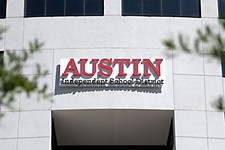More Details Emerge on Proposed Tax Rate Increase
Will Austin ISD suggest an increase? Will voters approve?
By Brant Bingamon, Fri., May 3, 2024
Listening to the discussions of Austin ISD’s board of trustees at a meeting three weeks ago, it seemed a certainty the district would ask voters to increase the school tax rate at the November election. And that is probably still true. But the board took a harder look at raising the rate at its April 25 meeting, and what it found disturbed some members.
The members were particularly put off by where the money raised by the rate increase would go. Twenty-five percent of it will stay in Austin ISD, they learned. The remaining 75% will go back to the state of Texas, despite the fact that Republican leaders have refused to increase funding for the public schools for the last five years, creating the need for the tax increase in the first place.
District leaders floated the idea of raising the rate in response to a $60 million budget deficit they say will hit in the 2024-25 school year. Superintendent Matias Segura laid out a plan to halve the deficit with AISD budget cuts at a board meeting in early April, emphasizing that he would try to keep the cuts from impacting classrooms. However, he said the planned cuts would still leave the district carrying a $30 million deficit in the following year. So he and the board have explored raising the tax rate.
Segura said if the district proposes the increase and voters agree, the rate will rise from the current $0.8595 per $100 of home value to $0.9287, which would still be the second-lowest rate of the 12 Central Texas school districts. How much would this cost the average homeowner? Segura said the owner of a median-value home worth $563,000 who uses a homestead exemption would pay $4,300 in school taxes per year at the increased rate. That is $421 more than the $3,879 the same homeowner would pay at the current rate, or $35 more per month.
AISD calculates that the rate increase would provide an additional $44 million for the district, money that Segura said would be well spent on hiring instructional coaches and interventionists. “If you were to ask me, 'What are the next things that would have to come in?’ I would say those two would be it,” he said, “specifically the interventionists, because they are tied to so much in the system.”
It was at this point in the meeting that the board began grappling with the question of how much of the money raised from the increased taxes would stay in Austin. The new rate would bring in an additional $174 million, they learned, but because of the state’s complicated rules governing school district taxes, only $44 million – 25% – would stay in the district.
Trustee David Kauffman said Austinites might be okay with 75% of their taxes going to other Texas schools through the recapture process, but they couldn’t be certain the money would actually go there.
“The recapture funds may exceed the amount that the Texas Education Agency needs to distribute,” Kauffman said. “And then the TEA would have a surplus, which is then put into the general revenue fund that ultimately gets contributed to things like Operation Lone Star or statewide property tax relief.” He asked if it would be possible to raise the tax rate for now and then lower it again when the budget crisis has passed. District officials assured him that was possible.
Trustee Kevin Foster then described Texas’ school funding system as sharecropping, “the traditional arrangement where you raise some goods, and the owner takes a ton of them, and every year you fall further behind.” He continued: “We’re talking about taking a taxpayer’s dollar and throwing 75 cents of it into the ether so that we can get a quarter. I can’t square myself with that ethically.”
Trustee Candace Hunter agreed that Texas’ system is, as she put it, “reprehensible.” But she said the question before the board was between raising the rate or making deeper cuts next year, cuts that could affect students. She agreed with Segura that it was crucial that the public understand the predicament the district is in and said she is confident voters will approve a rate increase if they’re asked to.
“I think they will say yes because they understand the kind of rock and a hard place where we are,” Hunter said. “My comment is: We’re damned if we do, and we will for sure be damned if we don’t.”
Got something to say on the subject? Send a letter to the editor.









